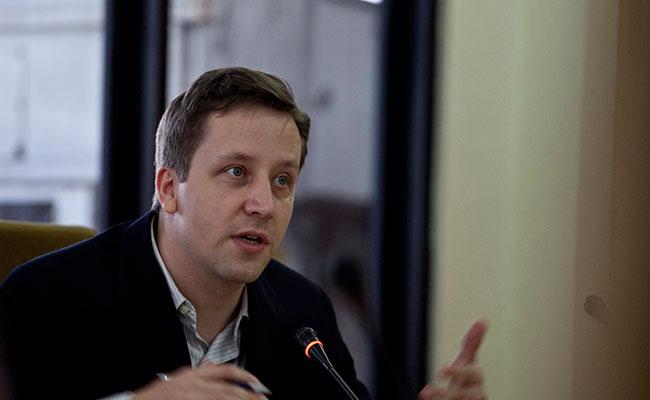Expert Interview with Juhani Grossmann, Anti-Corruption Expert
Supporting developing countries to implement transparent, accountable government systems

Juhani Grossmann has been implementing anti-corruption and election programs in Eastern Europe and Southeast Asia for more than 15 years. He currently leads the team from MSI, A Tetra Tech Company, that is implementing the U.S. Agency for International Development-funded Strengthening Integrity and Accountability program (USAID CEGAH) in Indonesia. His team supports 17 Indonesian agencies, including the Corruption Eradication Commission, the Supreme Audit Board, and the Administrative Reform Ministry, in improving their accountability mechanisms. These include whistleblowing systems, access to government information, civic oversight of public services, complaint handling systems, internal accountability management, performance auditing, case management systems, and extensive public opinion research.
He previously worked on campaign finance reform in the Philippines and led an assessment of its 2010 automated elections. He headed Tetra Tech’s component of the Millennium Challenge Corporation Threshold Country Plan in Ukraine, which aimed to strengthen civil society efforts in combating corruption through more than 80 local reforms, and led the country’s most in-depth study of corruption. He holds master’s degrees in public management from the Hertie School of Governance and in international conflict resolution from Landegg International University.
What are the biggest challenges on the horizon for Indonesia in terms of combating corruption?
Indonesia has an extremely successful national anti-corruption agency, the Corruption Eradication Commission (KPK), which has made major progress in investigating and prosecuting high-level bribery and corruption. This includes ministers, members of parliament, high-level government officials, judges, and, most recently, the Speaker of Parliament. This success distinguishes Indonesia from its peers, where specialized anti-corruption agencies often struggle. Yet, Indonesia’s overall situation with corruption has only improved very slowly. It stands to reason that much wider enforcement action of petty level corruption, stiffer penalties, or widescale prevention efforts are needed—perhaps all three. This is a significant challenge in a country of more than 250 million citizens and 17,000 islands.
How can reducing corruption help countries counter the rise of violent extremism?
Extremists benefit from the same systematic weaknesses that other organized criminals exploit. This includes weak law enforcement, porous borders, fraud, embezzlement, and money laundering. Each of these factors have a very close connection to corruption and weak governance. Police might be induced to look the other way when explosives are being transported. Customs might allow the entry or departure of extremists. Fraudulent schemes can be used to fundraise for dubious charities. Government development funds might be channeled to intolerant organizations, and the origin of funding obscured. Accordingly, many of the anti-corruption measures, including those implemented by USAID CEGAH, have a direct impact on reducing extremists’ ability to operate.
What are some innovative approaches Tetra Tech has developed to help reduce corruption in Indonesia and other developing countries?
Tetra Tech runs exceptionally versatile anti-corruption programs largely focused on preventing corruption. We recognize that reducing corruption requires a comprehensive multi-pronged approach. We helped Indonesia increase accountability in the political space by helping the government develop disclosure and reporting standards for campaign contributions. We are engaged in a massive effort to both roll out and upgrade the national complaint handling system (LAPOR!SP4N), which already receives more than 500 complaints a day. We also assist the government to engage constructively with the private sector to prevent corruption through the adoption of preventative anti-bribery systems as well as more coercive efforts, such as corporate criminal liability.
In your years in Indonesia, what do you think has been the most positive development for anti-corruption?
By far the most impressive phenomenon I have witnessed is the perseverance of KPK. Under intensive political and legal pressure as push-back for its enforcement successes, the agency’s staff and leadership have persisted at tremendous personal sacrifice, reeling in one “big fish” after another. While fighting corruption is a marathon that requires many prerequisites, Indonesia’s graft-fighters are certainly proving that they have the necessary endurance.
What are some of the elements that make CEGAH successful, and what would you like to see accomplished going forward?
CEGAH benefits from the tremendous dedication of not just the KPK, but also the other 17 government agencies we cooperate with. Our staff expend great energy to ensure that our programs remain relevant to them. In the future, I would like to see us achieve a certain economy of scale in these efforts and share successes—and failures—from one agency to another. This resembles tuning a car while it is barreling down the road and certainly will not be easy, but it should allow us to achieve more with less.
CEGAH is keen to get a better understanding of the key corruption enablers for extremist activity, so that lessons learned can be applied to other country contexts. For example, which anti-corruption interventions in the prison system—in areas such as procurement, oversight, or recruitment—could curtail extremist groups’ ability to operate from and recruit within prisons? And, equally important, how are such interventions transferrable to other countries that might have different governance systems and security environments? CEGAH is working hard to determine these cross-sectoral impacts.

